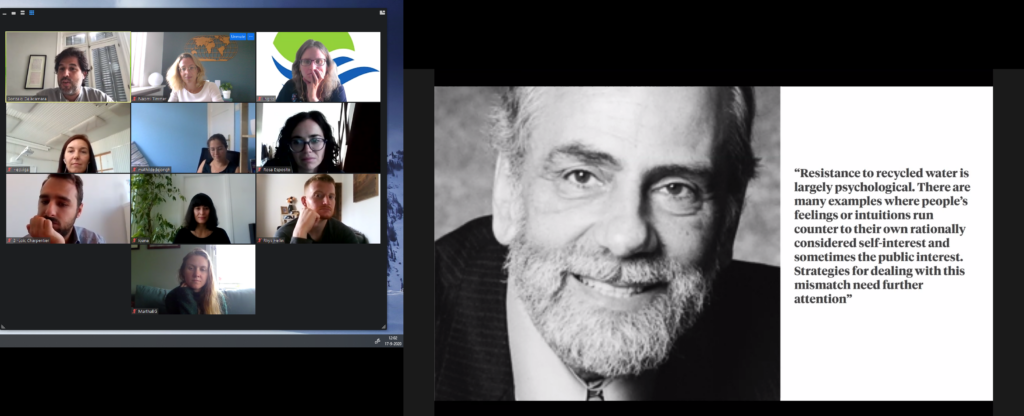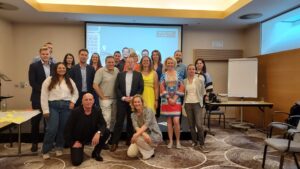A Masterclass of Gonzalo Delacámara, IMDEA – Thursday 17 September 2020
As a Natural Resources Economist Gonzalo is involved in Water Governance initiatives around the world. Supporting work of the OECD (where he is a member of its Water Governance Initiative), World Bank Group, UN agencies and programmes, the European Commission and Parliamant in providing a framework to talk about policies and interests next to countries.
In the development of the governance approach we first talked a lot about integrity/ avoiding corruption, engaging stakeholders and being transparent and accountable. It transferred to ‘right people doing the right things’ for sustainable water resource management, thus getting it right with the institutional setup. But this is not enough either. We need to master complexity.
The global pandemic makes it clear. Everything seems to be a governance failure. There should be no choice between Health or Jobs; aren’t we able to deal with it all? We need to be aware that water policy is invected and affected by all other policies. In fact, it may be argued that there is no such thing as water policy.
We live in a world in which we are facing a cascade of uncertainties. We can’t look at the future and only see progress. Three main layers of uncertainty are:
1. Climate change: it affects us all, but not all in the same way, likewise the COVID-19 pandemic. We need to be aware of the fact that people are beautifully contradictory and need to find the right trade offs to act. To influence this we need innovation in a wide sense to master complexity.
Macroeconomic performance: we were on our way to a recession or at least sluggish growth patterns (even in the absence of COVID-19). Financial opportunities for water are there. There is high commitment to invest in water and even apetite from commercial financiers,yet we still face constraints to absorb that liquidity. Money may well not be a binding constraint in many situations. Water crises are always governance crises. It is not just lack of money, technology, etc. but rather our inability to deal with complexity.
Structural changes in the economic model: for instance, as an outcome of digitalization. A water utitility is no longer responsible for managing infrastructures, water and a public service, now they have to manage data. Being aware of this creates a need to transform.
We have (too) good reasons to make (too) bad decisions in water resource management. Why and how do we make decisions today? We tend to make problems small and specialized and solve them on a one-by-one basis. With that approach we overlook or downplay complexity and all interdependencies. Don’t just talk about water. Everything that is is important probably happens outside water policie – look for example to migration patterns. Water productivity is often a very powerful driver to water use in the world, with unintended consequences.
Water use efficiency is improving all over the world through changing techniques, but at the end of day we end up using more water because water becomes more valuable for some economic uses. Each and everyone of us becomes more efficient but the paradoxical outcome is that as a collective we all use more. A governance failure is not to offset this.
Adding resilience, transformative needs, adaptabilty concerns to water management only adds to complexity. We need to reframe water in the terms of long-term security, a “new” public good. We need to start making efforts to ensure its sustainable provision, leaving no one behind.
We also need innovations, disruptive innovations. True game changers. There is no technical restraint about this; if it is not happening is mainly due to governance failures, to inertia. A major disruption would be to acknowledge our condition as human species. What can we do as humankind is to align individuals interests to to socially agreed long-ter, collective goals.
People matters, their psychological perceptions matter (preferences, aspirations, contradictions…). It all comes back on how and why do we make the decisions we make.
So what would help us? People don’t want water as such, they want security and wellbeing and income…. Water is a (vital) means but a means after all. We want people to be better off, socially and economically. And there is evidence that people want to know what is going to happen, to anticipate to some extent the future, in order to be in control of their lives. So start talking about that!
What our (EJWP) contribution should be?
1. Commit to societal challenges. Set right priorities.
2. Do not provide simplistic answers to complex issues. Face reality.
3. Try not to empoverish your language. The degradation of ideas comes next.
Living is difficult, but we would not quit. We need to train ourselves in understanding complexity and its effects on the world.
Acknowledge complexity and uncertainty and be positive and confident. We can deal with it






